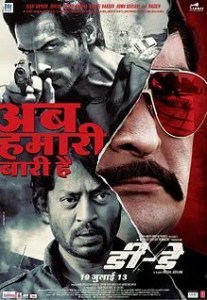Buy the soundtrack at Amazon or iTunes
When reviewing a remake, comparison to the original can be unavoidable. One can’t very well unsee a movie just to be able to evaluate its remake without preconceptions. The question then becomes: had I not seen the original, how do I think I would feel about the remake?
Had I seen Rocky Handsome first, I presume that I would have found it convoluted but interesting, especially in regard to its brutal violence and dark thematic elements. However, having already seen The Man From Nowhere — the South Korean film on which Rocky Handsome is based — the Hindi remake doesn’t hold a candle to the original.
Rocky Handsome‘s story is virtually identical to The Man From Nowhere, though the action shifts from Seoul to Goa. A solitary pawn shop owner (John Abraham) nicknamed “Handsome” by his neighbors goes on a killing spree when gangsters kidnap Naomi (Diya Chalwad), a neglected little girl who lives in his building. As Handsome tracks down Naomi, the cops and gangsters pursuing him learn the truth about this mysterious assassin.
Structural changes by director Nishikant Kamat and writer Ritesh Shah make the early parts of Rocky Handsome confusing. Apart from an opening credits musical flashback to Handsome’s romance with Rukshida (Shruti Haasan), the first twenty minutes focus on his tenuous friendship with Naomi, with only a glimpse of the girl’s drug-addicted mother, Anna (Nathalia Kaur). There’s no setup for an intense scene when Naomi discovers her mother being tortured by gangsters in their apartment.
A flashback explains that, one month earlier, Anna stole some heroin without realizing it belonged to notorious mafia brothers Kevin (director Nishikant Kamat) and Luke (Teddy Maurya) Fereira. In The Man From Nowhere, the theft is the opening scene. The audience knows that there will be hell to pay, but not how or when, thus building tension, if not dread.
Also during the flashback, the local police present a rapid-fire montage of the main players in the Goa drug trade, as if it’s possible for the audience to remember so many characters and relationships introduced in such a short span of time.
The selling point in the trailer for Rocky Handsome is the movie’s violence, which is handled well. It’s bloody and cruel, and John Abraham successfully pulls off everything from shootouts to knife fights. A dilapidated church is an eerie staging ground for a climactic battle.
Abraham is less successful in his characterization. As a man grieving his dead wife, he seems more emo than haunted. He first appears on screen slouching under a hoodie like a sullen teen.
Characterization is the biggest problem in Rocky Handsome. Naomi is too chipper, especially compared to her world-weary prototype from The Man from Nowhere, So-Mi. The brothers’ Thai assassin Attila (Kazu Patrick Tang) is flat and has no impact on the narrative, unlike the vitally important Rowan from the original.
Worst of all is Maurya, who turns eccentric Luke into an impotent joke. There’s nothing frightening to Luke’s antics, and he becomes increasingly annoying the longer he’s on screen.
Truth be told, there are few tense moments in Rocky Handsome. Bollywood doesn’t do menace particularly well, though Kamat and Shah had a perfect template to work from. Though there’s plenty of gore, they shy away from the best opportunities to scare the audience.
As I wrote at the outset, if I hadn’t seen The Man From Nowhere, I’d probably have been more entertained by Rocky Handsome. If entertaining is good enough, then by all means, buy a ticket for Rocky Handsome. But if you want greatness, skip it and watch The Man From Nowhere on Netflix instead.
Links
- Rocky Handsome at Wikipedia
- Rocky Handsome at IMDb
- The Man From Nowhere at Wikipedia
- Buy or rent The Man From Nowhere at Amazon or iTunes







